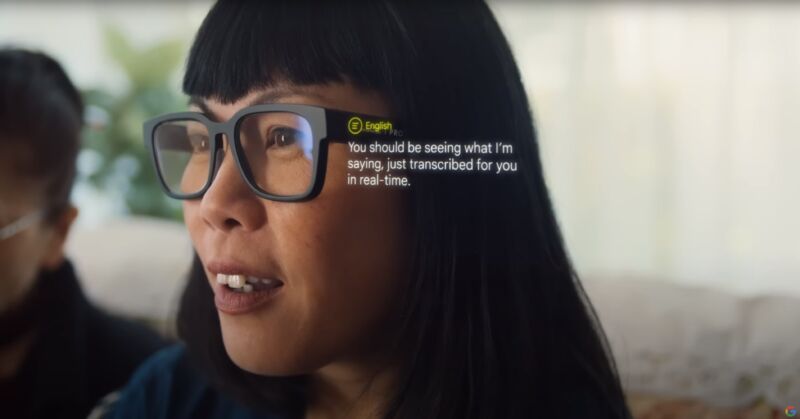
Google has reportedly scrapped plans to release a pair of augmented reality (AR) glasses. The cancellation of the gadget, reportedly codenamed Project Iris, marks the third time the company's supposedly thrown in the towel on AR glasses. The most recent specs were expected to become Google's second foray into consumer tech and feature a more mainstream-friendly appearance than Google Glass.
In January 2022, the rumor mill churned out its first details on Project Iris, thanks to a report from The Verge citing anonymous sources "familiar with the project." Iris was reportedly wireless with external cameras and left heavy graphical processing duties to the cloud.
Last year's report also described prototypes in development as being ski goggle-like, but Business Insider's report Monday claimed that those prototypes were actually for Google's AR partnership with Samsung and Qualcomm to make a mixed reality (MR) platform. Google announced the project alongside minimal details in February 2023.
Insider's report Monday cited three unnamed people "familiar with the matter" who said the goggles, after being in development for years, were canned "earlier this year." This reportedly came after a series of layoffs and corporate reshuffling at the company, including the departure of Clay Bavor. The 18-year Google exec announced his departure to start an AI firm in February. Bavor's most recent roles at Google were leading the VR/AR division for nearly seven years and heading the Labs division.
"Insiders say Google leaders kept changing the strategy for Iris, which led to the team continually pivoting direction, frustrating many employees," Insider reported.
AR for Android
Now, Google will reportedly hone its AR software rather than build AR hardware. According to Insider, the conglomerate is focused on creating an AR software platform—one Google hopes could be the "Android for AR," one employee reportedly told Insider—for headset makers to license. The prototyping platform is reportedly internally named Betty. Potential partners include Samsung and more.
Of course, it's common for Google to cancel projects and for developmental ones never to see mainstream release. Without Bavor's leadership amid the reported cost-cutting efforts from Google CEO Sundar Pichai, including the axing of Google's laptop division, there's likely little wiggle room for new consumer hardware endeavors around emerging technology. Focusing on AR tools could let Google build and make money off AR partnerships without immediately worrying about getting consumers excited about AR gear, something Google's failed to achieve in the past.
The news comes after Apple delivered shockwaves with an MR headset built above and beyond anything the consumer XR space has seen thus far. The $3,500 Vision Pro isn't a consumer headset for now, but it teases what a well-developed MR future could look like.
Meta, meanwhile, announced the Quest 3 MR headset for this fall. And The Information has reported that Meta will release a dev version of new AR glasses next year; although, Meta's new AR glasses aren't expected to reach consumers until 2027.
Despite what other Big Tech firms are doing, Google focusing on software could address an obvious pain point in consumer AR adoption: finding fun and helpful uses that grow interest in using the technology daily. Of course, Google AR software development could focus on enterprise uses, too.
Glass half empty
That leaves dreams of a Google AR hardware resurrection occurring soon murky, right after a period when it seemed more possible than it had in years.
In 2020, Google bought North, maker of the Focals AR glasses. Focals stood out among AR specs thus far by looking like a regular pair of glasses (I even got away with wearing a pair around the zoo with minimal double takes from passersby), a feature that the Glass sorely missed. Google even promoted AR-based translation features on a discreet-looking pair of AR glasses last year, while Pichai has touted AR developments, like multi-search, scene exploration, and Live and immersive views in Maps. and AR features for Google Lens.
But Google stopped selling Google Glass Enterprise Edition in March and hasn't had a consumer-facing AR headset since 2013's original Google Glass. Ahead of its time and too questionable-looking to set any trends, Google stopped selling the consumer goggles in 2015.
Insider cited two employees who claimed Google could bring back Iris and that there are still teams exploring AR technologies, though some Iris-focused teams have moved on to the Betty platform or Google's MR partnership with Samsung.
Google didn't respond to Ars' request for comment.
Article From & Read More ( Google reportedly gives up on making AR glasses—for the third time - Ars Technica )https://ift.tt/TGOxcpU
Technology
No comments:
Post a Comment